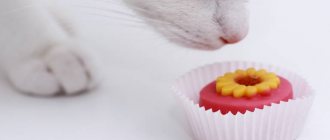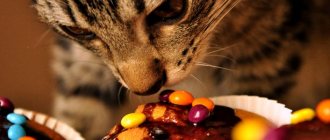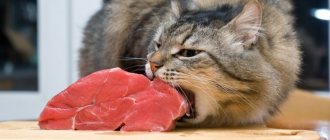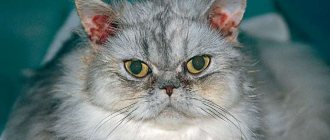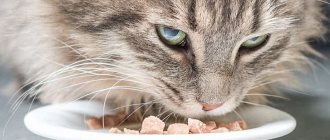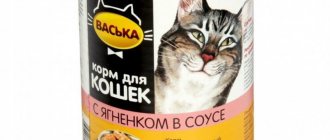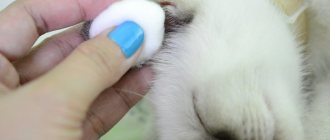Why can't cats have sweets?
Can cats have sweets? Many owners wonder when they see their pet eagerly gobbling up the cake, chocolate or ice cream they were treated to.
It’s worth noting right away that cats do not feel the taste of sweets, since there are no receptors on their tongues that detect such a taste. The animal also lacks a number of enzymes that ensure the digestion of sugars, which is why they only harm their health. Owners need to remember exactly that cats are not allowed sweets. What attracts an animal to something sweet is not the taste, but the smell or texture. Regarding the ice cream that they are treated to in the hot weather, everything is quite simple - pets do not need its sweetness, but cold. Also, the cat may like the oils included in the sweets. Thus, it is clear why a cat, in principle, cannot love sweets and it is not sugar that is attractive to her.
Deny or allow?
The main reason why cats cannot eat sweets is the presence of sugar in treats.
As the famous saying goes, sugar is sweet poison, and for cats it works one hundred percent. Is it possible to give cats sweets at least in small quantities? This is a question that each owner answers for himself, based on many factors: the recommendations of the veterinarian, the general health of the pet, its character and personal relationship with it. After all, everyone knows that cats remember refusals, get offended, and the most characteristic ones can even take revenge.
It often happens that the animal begs for sweets. In this case, veterinarians recommend giving your pet a microdose of treats. It is unlikely that anything terrible will happen to him from a drop of condensed milk or yogurt. The main thing is to do it in doses, preferably as encouragement.
Another way to limit sweets is to outwit your pet by switching his attention to a healthy treat designed with all his needs in mind. Now there is a huge selection of such “desserts” for cats.
They are available not only in different flavors, but also in a wide variety of formats and textures: straws, cream, fillets, purees, rolls, etc.
If you suddenly haven’t taken care of your furry friend and he has eaten too much condensed milk, chocolate, cookies or ice cream, it is important to take him to the veterinarian for an examination, donate blood and monitor his blood glucose levels. This will help prevent dangerous diseases
When does a cat need sugar?
In rare cases, a cat needs sugar as medicine. This phenomenon occurs during the recovery period of an animal after a serious illness, when it is exhausted and there is a reduced level of sugar in its blood compared to what it should be normally. However, sweet medicine can only be used as prescribed by a veterinarian. The cat owner himself should not prescribe such therapy.
In this situation, the cat is given a glucose solution or regular sweetened water. During such treatment, strict monitoring of the animal’s condition is required in order to promptly stop the supply of sweets. Even during treatment, the following sweets are prohibited for the animal :
- confectionery;
- sweet dairy products;
- chocolate;
- sweet carbonated drinks (some cats readily drink them).
In order not to harm your pet, you must strictly follow all the veterinarian’s recommendations. If the cat is not ready to drink sweetened water, it may be forced to drink it. It is also not uncommon to resort to the simplest method and give the pet IVs with glucose, which can be not only intravenous, but also subcutaneous.
You cannot uncontrollably use sweet therapy for a cat, even when she is old and she always gets better after it. A loving owner should know how to properly support an animal, and therefore older cats need to be managed by a veterinarian.
Chocolate and its effect on the cat's body
Some cats are true gourmets and show a special love for chocolate, but you shouldn’t be touched by it. Chocolate is extremely dangerous for the health of cats, not only because of the sugar. As you know, cocoa contains theobromine alkaloid, which is pure poison for cats. After eating a small amount of chocolate, the animal’s blood pressure will certainly increase, it will be active and overexcited, and arrhythmia may develop.
If you continue to periodically treat your pet to cocoa-containing products, he will develop heart and nervous system diseases, and a serious allergy is possible.
Large doses will definitely lead to coma and death. Kittens and cats with weakened immune systems are especially vulnerable.
The critical dose of theobromine, of course, varies from person to person, but on average it is 200 mg per 1 kg of animal weight.
Milk chocolate contains theobromine in an amount of 220 mg per 100 g of product. In black - twice as much.
How can sweets harm cats?
A cat gets a lot of harm from eating sweets. For this reason, a loving owner will never test the animal’s strength and feed it sweets, justifying himself by saying that the cat loves sweets.
Also, sometimes animal owners find the following excuse for improper feeding: “If the cat eats sweets, it means that she lacks something that is contained in it.” Alas, such excuses are only needed so as not to scold yourself for the fact that the cat became seriously ill and, as a result, her eyelids were significantly reduced.
Hot and not sweet ice cream
In hot weather, ice cream is, on the one hand, useful for a cat, as it helps its body cool down, but on the other hand, due to the sugar, it causes significant harm to it. In order for the cat to receive only the benefits of the product, you need to prepare ice cream for it yourself, simply freezing cream or milk churned with butter.
Sweets and cats are not compatible, and you should not look for an excuse for your unreasonable behavior when an animal is given something that only harms its health. Sweet tastes are of no interest to cats.
Consequences of long-term inactivity
There is no need to hesitate to act or treat the warnings of veterinarians without much trust; having figured out what will happen to cats that eat sweets, every owner will not be able to remain indifferent.
After all, the consequences can be dire, especially when it comes to lactating or pregnant individuals, as well as older animals.
No matter how healthy your pet was before introducing sugar-containing foods into their diet, big problems will arise over time.
When does a cat need sugar?
Cats do not have receptors that allow them to sense sweet taste. Unlike dogs, they are 100% carnivores, whose digestive system is designed to digest protein foods with a small addition of carbohydrates.
In the wild, having caught a mouse, a cat, eating the entrails of a vole, will receive a small amount of grain and grass located in the stomach of the trophy, but this amount is extremely small and is partially processed by the juices of the rodent.
Sometimes the cat eats grass itself, wanting to cleanse the gastrointestinal tract of fur. An animal that eats ice cream, chocolate, or cookies does not feel the sweet taste; it is attracted to milk protein, fats, and amino acids. Cats don't need sugar. Carbohydrates are necessary for a balanced diet, but “good”, slow: rice, buckwheat, vegetables, fruits.
The exception is the recovery period after an illness, when the body is exhausted and the blood sugar level is below normal. On the recommendation of a veterinarian, the mustachioed patient is given sweet water and glucose, periodically undergoing tests to ensure timely cessation of therapy.
Confectionery and sweet drinks are not allowed. Diabetic human products containing xylitol and similar substitutes cause severe poisoning. It is possible to administer glucose through droppers or subcutaneous injections.
Favorite but harmful treats
Some of the sweet preferences of cats include chocolate, ice cream and sucking candies (on a stick, caramels). Most owners admit that they can sometimes give their cats sweets, but very little, as a treat. The difficulty is that sweets do not cause immediate harm, that is, the cat does not feel ill immediately after eating a piece of ice cream. The period of time and gradual development of most pathologies leads to the fact that the owner does not connect the pet’s illness and the fact of eating sweets.
Any experienced owner and veterinarian will tell you that giving them chocolate is a big mistake. Real chocolate is poison for cats and dogs. For poisoning, which leads to liver failure, a large dog needs to eat a chocolate bar (100 grams), while a cat needs 30–40 grams. Naturally, we are not talking about a surrogate treat, but about real chocolate, which contains cocoa and caffeine. Natural chocolate contains methylxanthine (an alkaloid), which (in sufficient quantities) literally stops the liver. However, you shouldn’t expect any benefits for your pet’s health from fake chocolate.
Warnings about the dangers of chocolate are based not only on experience, but also on research. Veterinarians monitored the dynamics of poisoning and the rate of its progression. Anamnesis collection and autopsy testimony allowed us to draw clear conclusions - the animals died from chocolate poisoning. By the way, the mechanism of poisoning and the dose of the deadly delicacy could not be clarified. Veterinarians have accepted it as fact that chocolate is toxic to small pets.
Even special chocolate treats sold in pet stores are not as harmless as they say on the packaging. As mentioned above, there is no point in such treats, because cats cannot like sweets due to the fact that they do not feel this taste.
The favorite treat of adults, children and cats is ice cream. It would seem that a dairy product should not be harmful, but everything is not so simple. Firstly, there is sugar in ice cream, and secondly, the store-bought product hardly contains milk. Even if we take ice cream as an example, which was once produced according to GOST, it contained cream and butter - extremely harmful products for a cat’s liver. A cat that has received too much sugar suffers from intoxication, in other words, from poisoning.
Another favorite treat is condensed milk. The logic of the owners is similar, although the milk may be sweet, it means it cannot be harmful. The warnings are the same: condensed milk contains a lot of sugar, and the store-bought product includes preservatives, flavors, unnatural sweeteners and exclusively powdered milk. The cat does not feel the sweet taste, powdered milk is not beneficial, so is there any point in treating it with such a treat?
What could be healthier than fermented milk products for cats who love milk? Every guide to feeding four-legged animals recommends diluting the cat’s diet with yogurt, kefir, fermented baked milk, etc. However, not every guide specifies that the products must be natural and not store-bought. Only in this case can we talk about real benefits. Any fermented milk products with sweeteners are harmful, which means store-bought yogurt should be excluded from your pet’s diet. Moreover, the cat may not benefit from natural fermented milk products, since some adult animals do not digest milk sugar.
When consuming store-bought dairy products with sweeteners, a cat may suffer from chronic conjunctivitis, and this is not a coincidence. Many owners didn't know how to eliminate bad odor from their cat's ears, and it can also be caused by eating sugar.
The owners of sweet dogs can only wish patience in re-educating their charges. Try to balance the diet, take a vitamin course and gradually wean your cat off sugar. If your nervous system cannot withstand the onslaught of pleading eyes, offer your cat a piece of dried apricots (no raisins) or peanuts. These products are not healthy for the cat and contain a lot of carbohydrates, but are safer than sugar.
Another safe alternative is special treats (sweet) for animals, which are sold at the pet store. However, be careful, many owners have weaned cats from eating sugar in favor of treats, but they cannot exclude them from the diet
It is important that any additives to the main diet are strictly rationed
Is it possible to give sweets to cats?
Of course, a cat won’t die from one cookie, but why give your pet something that harms it? Fast carbohydrates contribute to changes in eating behavior: they instantly fill you up and dull the feeling of hunger for a short period. Sugar is quickly absorbed and hunger returns.
Excess calories become fat. Excess body weight creates unjustified additional stress on the heart, lungs, joints, and circulatory system, and hormonal balance is disrupted.
It is especially harmful to give chocolate to cats. Caffeine excites the central nervous system, increases blood pressure, makes the heart beat faster, and provokes muscle tremors. Large amounts of theobromine, which is found in all types of chocolate, can cause the death of an animal.
Cats that regularly consume illegal sweets suffer from:
- diabetes mellitus;
- blindness;
- fungal diseases;
- conjunctivitis;
- allergies, dermatitis;
- low immune defense;
- kidney and liver diseases;
- pathologies of the nervous, cardiovascular, and digestive systems.
Eating sugar can cause infertility in a cat, complicate the course of pregnancy, lead to the birth of still babies, and threaten premature aging.
In what form can a cat eat sweets?
Nature has not endowed the cat’s body with the ability to synthesize insulin, which breaks down sugar; large amounts of glucose are simply not absorbed. Therefore, all confectionery products, sweet yoghurts, and drinks are prohibited to those with a mustache, even if they express a desire to treat themselves.
This happens in the case of vitamin deficiency, the desire to get food from the owner’s hands, sympathy for a certain consistency of food, or a tempting aroma.
You can offer your cat a healthy alternative - apple, plum, pear, apricot, blueberries, raspberries, strawberries. Many people like honey, but the product is a strong allergen; it is necessary to introduce it into the diet in small doses, monitoring the body’s reaction.
Dry and fresh fruits do not force the cat to eat if he doesn’t want to. Wanting to give your pet a cooling treat, they freeze natural milk. Cats happily eat this homemade ice cream; the lack of sugar in it does not bother the animals.
Exceptions
But you shouldn’t paint everything with the same brush, because there are situations when your cat still needs sugar.
This is usually associated with various diseases or the postoperative period, when the amount of glucose in the blood greatly decreases.
In this case, even the veterinarian himself will tell you what needs to be changed in the animal’s diet, albeit temporarily.
Can cats have sweets?
Can cats have sweets: can cats taste sweets and why they can’t have sweets.
Sweets are of no interest to cats. Unlike even dogs, cats love only one thing - meat (as well as sleep and play). And this is not at all because they are super-predators who are eager to kill, but because, unlike other mammals studied, they simply do not taste sweetness.
On the surface of the tongue of most mammals there are taste receptors, the proteins of which bind to food entering the mouth, recognize its type, and send this information to the brain. For example, in humans, there are five types of taste buds that respond to salty, sour, bitter, sweet and umami (meat). The receptor responsible for sweetness consists of two proteins created by two separate genes - Tas1r2 and Tas1r3. Any sweetness is, first of all, carbohydrates - an important source of energy for herbivores and omnivores, like humans. Cats are exclusively carnivores, so they have never had the need to distinguish carbohydrates, which is why they lack the corresponding taste receptor (or, on the contrary, they do not eat carbohydrate foods due to the absence of this receptor).
In 2005, the Monell Chemical Senses research center in Philadelphia discovered that all felids (not just domestic cats, but also tigers, lions and others) are missing 247 base pairs of amino acids that make up the DNA of the Tas1r2 gene. As a result, it is not able to create the necessary protein, which is why cats do not feel the sweet taste and do not eat sweets.
Physiological characteristics of taste buds
- If we take into account numerous reviews from owners, we can conclude that their cats are crazy about sweets. They eat chocolate, ice cream, cakes and other delicacies. Looking at this whole picture for the first time, it may seem that the cat really enjoys this kind of meal.
- However, in reality things are a little different. Cats by nature are carnivores whose taste buds are not adapted to sweets. They simply don't perceive them. When such a treat hits the tongue, the pet feels the taste of vegetable fat, milk, nuts, but not the main sweetener (sugar).
- This feature is explained by the fact that the cat’s DNA line lacks the gene responsible for the perception of sweet taste. Humans have this gene, so people can enjoy various sweets and detect even the most hidden notes.
- If we are talking about an omnivore or herbivore animal, they need this gene. Because according to their characteristics, such individuals must receive carbohydrates, which are abundant in sweet dishes.
- But since cats are carnivores, they do not have a wild need for carbohydrates. Rather, four-legged pets require protein compounds. Sugar in this case is not beneficial, so there is no need to feel the sweetish taste.
- Cats need to be able to identify squirrels, and in this they can be envied. Animals are able to determine its presence not only by taste, but also by smell. When it comes to prey, cats sense how many hours ago it died.
- When looking for an answer to your question, you should start from the opinion of zoologists. As a result of lengthy and numerous tests, they came to the conclusion that cats cannot taste sweets, and therefore are not able to determine the amount of sugar consumed. That is, they can eat it immensely, so they often harm their body.
- For example, a pet enjoys ice cream because it smells notes of cream or milk. But in reality, she receives not only these components, but also a decent portion of sugar, which is not always safe for the body.
- Why can't cats eat sweet treats? Because it will absorb harmful carbohydrates, this will lead to poisoning and a significant deterioration in well-being.
Can cats be given raw eggs?
Why does a cat eat sweets?
There are many examples that some cats love sweets - they eat ice cream, chocolate or candy. The reason for this has not yet been determined, but perhaps a single protein created by the Tas1r3 gene allows them to somehow sense high concentrations of sugar. There are also several other explanations for this strange behavior:
- a cat may be attracted not by taste, but by smell; - it is possible that she wants some kind of sweetness because she feels the presence of salt, fats or some amino acids in it; — perhaps your cat just likes the texture of certain sweet foods
Why cats can't have sweets
It is likely that cats not only lack the ability to taste sweetness, but also the ability to digest and metabolize sugars. Their livers lack glucokinase, an important enzyme responsible for metabolizing carbohydrates, which prevents blood sugar levels from rising. Cat owners do not know about this feature and give them any sweets they ask for - chocolate, sweet yoghurts, sweets, condensed milk, etc. At the same time, most cat food manufacturers also approach this issue irresponsibly, adding corn and other grains to their products, which can lead to the development of diabetes.
Sources:
https://koshkamurka.ru/7525-pochemu-koshkam-nelzya-sladkoe.html https://kotikdoma.com/uhod-za-koshkami/pravila-pitaniya-koshek/mozhno-li-koshkam-sladkoe.html https: //igry-koshki.ru/mozhno-li-koshkam-sladkoe/
